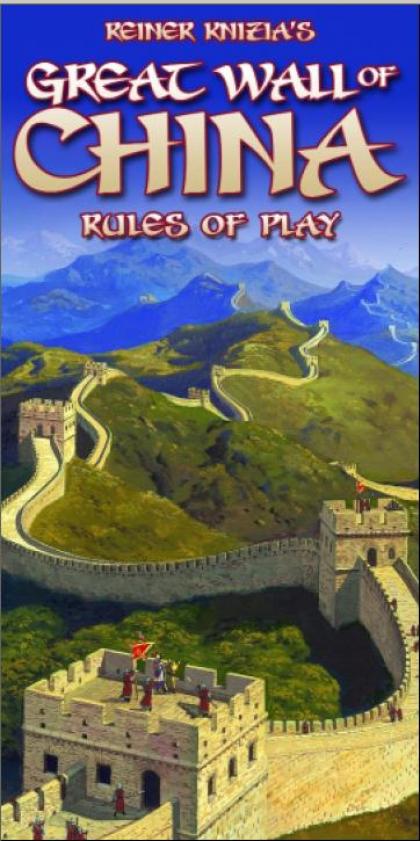This game lets each player take on the role of a Northern Chinese prince. His task: the construction of a massive wall. His reward: Honor everlasting! To gain the honor, though, requires some sweat. The requirements are the same for each player. Each player has a set of cards in his color: seven wall cards (worth 1 point), three gate cards (worth 2 points) and one watchtower card (worth 3 points). Additionally, each player gets nine more cards of varying point value and which may also allow special actions to be carried out.
At the start of the game, each player shuffles his deck of 20 cards and places it face-down in front of himself. He then draws five cards from the deck. Now, depending on the number of players, 2 to 4 pairs of prestige tiles (with values from 1 to 8) are set out as the starts of card rows.
On a player's turn, he first checks to see if he has a point majority in any of the card rows. Then, he carries out two additional actions. He has the choice of either drawing another card from the deck or adding cards to one of the rows. The added cards must be identical. It is then the next player's turn.
If, when checking point totals, a player sees that he does have one or more majorities, then he chooses one of the prestige tiles and puts it onto one of his cards in that row. That prestige comes at a price: as long as the second prestige tile isn't claimed, the value of the prestige is subtracted from that player's total for that row. Once the second tile is claimed (which can be by the same player on a later turn), then both winning players set the tiles they won aside to score. Two new prestige tiles are revealed and the prestige for that row replenished.
The fight for prestige is also influenced by cards with special actions. For example, if a 'noble' card (1) is played, then the values of all cards in that row are reduced to 1. A 'dragon' card (1) can be played onto another player's card, neutralizing it. 'Cavalry' (2) are worth 2 points, and, equally valuably, do not cost an action. 'Infantry' (5) are strong in groups. A single 'infantry' card is only worth 1 point, but the next one is worth 2, and then 3, etc.
The game ends either when one player has played his last card or when the last prestige tile is taken. Afterwards, each player gets one last turn and then all card rows are resolved in turn order. The player with the most prestige at the end of the game wins. Players only receive prestige for tiles they have set aside for scoring. Tiles remaining on wall segments do not score.
- Great Wall of China
- De Chinese Muur
- Chinesische Mauer
- La Gran Muralla China
- Kitajski zid
- Pan tu nie stał!





Voti e commenti per Great Wall of China
Nessun commento
Nessun commento
Gioco di carte meno banale e più profondo di quanto non possa sembrare. Durata limitata e buona interazione. Da provare
giocato 1 volta.
classico gioco di maggioranze alla knizia. gradevole e veloce ma nulla di nuovo.
nel suo genere c'è di meglio.
voto 5,5
Per scrivere un commento e per votare devi avere un account. Clicca qui per iscriverti o accedere al sito
Accedi al sito per commentare e votare